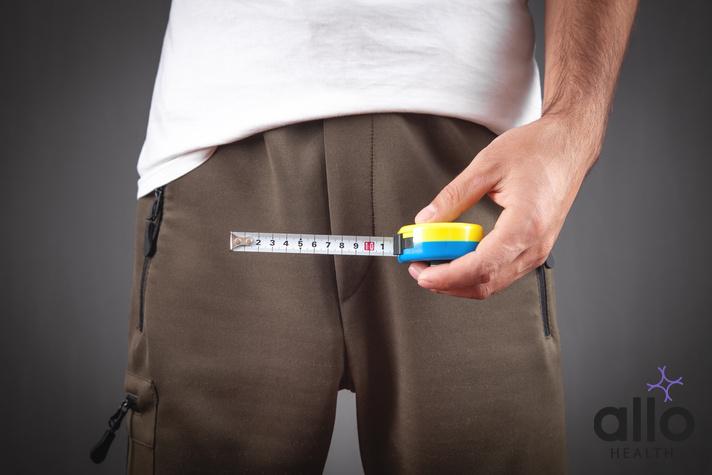All About Premature Ejaculation Surgery

Allo Health is dedicated to personalized well-being, offering support and trusted information tailored to individual health goals. The platform emphasizes human-generated content, led by a distinguished medical team of experts, including physicians and sexual health specialists. Their commitment to credibility involves rigorous fact-checking, authoritative research, and continuous updates to ensure accurate, up-to-date information. Allo Health's unique approach goes beyond conventional platforms, providing expert-led insights and a continuous commitment to excellence, with user feedback playing a crucial role in shaping the platform's authoritative voice.

Dr Sanina Mansoor holds MBBS degree from Yenepoya university,Mangalore.She has 8 years of experience working as a medical officer at various health centres and medical colleges.
Why This Was Upated?
Our experts continually monitor the health and wellness space, and we update our articles when new information became available.
Updated on 13 February, 2024
- Article was updated as part of our commitment to diversity, equity, and inclusion.

"The following blog article may discuss medical treatments and interventions. However, it is important to note that the information provided is for general educational purposes only and should not be considered as a substitute for professional medical advice, diagnosis, or treatment. Always seek the guidance of a qualified healthcare professional for personalized medical advice.
Book consultation
Medical treatments are complex and should be tailored to individual circumstances. The information presented in this blog may not be applicable to everyone, as each person's medical condition, history, and needs are unique. Only a qualified healthcare professional can evaluate your specific medical situation, consider relevant factors, and provide appropriate recommendations for diagnosis, treatment options, and monitoring.
It is crucial to note that self-diagnosis, self-medication, or relying solely on the information provided in this blog for treatment decisions can have serious health consequences. "
For many men, premature ejaculation (a type of sexual dysfunction) can be a source of great embarrassment and can hinder their ability to enjoy a healthy sex life. Fortunately, there are now several surgical options available that can help alleviate the symptoms of premature ejaculation and improve a man’s sexual health. In this article, we’ll explore the benefits of premature ejaculation surgery, what the procedure entails, and potential risks and complications.
What is Premature Ejaculation and How Does it Affect Men’s Sexual Health?
- Definition: Premature ejaculation (PE) is a common sexual dysfunction characterized by uncontrollable ejaculation occurring sooner than desired during sexual activity.
- Duration Criteria: PE is often defined as ejaculation within one minute of penetration, causing distress and dissatisfaction for both partners.
- Causes: Factors contributing to PE include psychological issues (anxiety, stress), biological factors (genetics, hormonal imbalance), and relationship dynamics.
- Impact on Sexual Health:
- Physical Consequences: PE may lead to frustration, performance anxiety, and a strained relationship.
- Psychological Effects: It can result in low self-esteem, depression, and avoidance of sexual intimacy.
- Diagnosis: Physicians assess medical history, and sexual history, and perform physical examinations to diagnose PE. Patients may be referred to specialists for further evaluation.
- Treatment Options:
- Behavioral Techniques: Include the start-stop technique, Kegel exercises, and the squeeze method.
- Medications: Selective serotonin reuptake inhibitors (SSRIs) and topical anesthetics are prescribed to delay ejaculation.
- Counseling: Sex therapy addresses psychological factors, enhancing coping mechanisms and communication.
- Lifestyle Modifications: Healthy habits, stress management, regular exercise, and a balanced diet contribute to overall sexual well-being and may help manage PE.
- Seeking Professional Help: Men experiencing PE should consult healthcare providers to explore suitable treatment options tailored to their specific needs and circumstances.
Different Types of Premature Ejaculation Surgery Explained
- Penis Enlargement Surgery (Phalloplasty):
- Surgical procedure to increase penile length or girth.
- Limited evidence supporting its efficacy for treating premature ejaculation.
- Penis Implants (Penile Prosthesis):
- Involves surgically placing a device in the penis to enable an erection.
- Not primarily intended for premature ejaculation but may impact overall sexual function.

- Selective Neurotomy:
- Targets specific nerves of penis to reduce sensitivity.
- Emerging as a potential treatment but lacks widespread acceptance.
- Circumcision:
- Removal of the foreskin, sometimes suggested for premature ejaculation.
- Controversial, as its effectiveness remains debated among medical professionals.
- PRP Therapy (Platelet-Rich Plasma):
- Injections of the patient’s platelets into the penis.
- Intended to improve sexual function, but research on its effectiveness for premature ejaculation is ongoing.
- Psycho-Sexual Therapy:
- Non-surgical approach involving counseling and behavioral techniques.
- Addresses psychological factors contributing to premature ejaculation.
Surgical interventions for premature ejaculation are generally considered a last resort due to associated risks and limited long-term effects on effectiveness. Consulting with a healthcare professional is crucial before considering any surgical procedure.
Who is a Good Candidate for Premature Ejaculation Surgery?
- Severity of Condition: Candidates for premature ejaculation surgery typically have a severe and persistent form of the condition that doesn’t respond well to other treatments.
- Failed Conservative Treatments: Individuals who have tried and failed with conservative treatments such as behavioral techniques, medications, and behavioral therapy may consider surgery.
- Negative Impact on Quality of Life: Candidates often experience a significant negative impact on their mental health, self-esteem, and overall quality of life due to the persistent nature of premature ejaculation.
- Health Assessment: A good candidate undergoes a thorough health assessment to ensure they are fit for surgery, considering factors such as overall health, medical history, and the absence of contraindications.
- Willingness to Accept Risks: Candidates should be informed about potential risks and complications associated with surgical interventions and be willing to accept these in pursuit of a potential improvement in their condition.
- Doctor’s Recommendation: The decision for surgery is often made in consultation with a qualified urologist or sexual health specialist who assesses the individual case and recommends surgical intervention based on their expertise.
- Understanding of Procedure: A good candidate has a clear understanding of the surgical procedure, its goals, and realistic expectations regarding potential outcomes.
- Psychological Evaluation: Psychological evaluation may be part of the assessment process to determine if psychological factors contribute to the condition, influencing the decision for surgery.
- Partner Involvement: In some cases, involving the partner in the decision-making process and ensuring mutual understanding and support can be crucial for a successful outcome post-surgery.
- Comprehensive Follow-Up Plan: Candidates should be committed to a comprehensive follow-up plan, which may include post-surgery care, monitoring, and potential adjustments to treatment based on the individual response.
Preparing for Premature Ejaculation Surgery: What You Need to Know
Before undergoing surgery for premature ejaculation, patients will need to meet with their doctor to review their medical history, discuss their symptoms, and undergo a physical examination. There may also be some lifestyle changes that need to be made in preparation for the surgery, such as abstaining from smoking or consuming alcohol for a short period of time before the procedure.

Patients need to understand that surgery for premature ejaculation is not always a guaranteed solution. While it can be effective for some individuals, others may not experience the desired results. Patients should have realistic expectations and discuss any concerns or questions with their doctor before proceeding with the surgery.
The Procedure: What Happens During Premature Ejaculation Surgery?
- Medical Evaluation: Initial assessment to determine eligibility for surgery.
- Anesthetic Administration: The patient receives anesthesia to ensure a pain-free procedure.
- Surgical Techniques: Options include dorsal neurectomy, selective neurectomy, or glans penis augmentation.
- Procedure Duration: Typically, a short outpatient surgery lasting about 30-60 minutes.
- Postoperative Care: Recovery period with guidelines on activities, medications, and follow-up appointments.
- Potential Risks: Complications may include infection, bleeding, or temporary changes in sensation.
- Effectiveness: Success rates vary; consultation with a urologist helps set realistic expectations.
Recovery and Post-Operative Care for Premature Ejaculation Surgery
After surgery, patients will need to take time to rest and recover. There may be some discomfort and swelling in the area, but this should subside within a few days. Patients will also need to avoid sexual activity with sexual partners for some time while their body heals from the surgery.
In addition to rest and avoiding sexual activity, patients should also follow any specific post-operative care instructions provided by their surgeon. This may include taking medication to manage pain or prevent infection, as well as keeping the surgical site clean and dry.
Patients need to attend all follow-up appointments with their surgeon to ensure proper healing and address any concerns or complications that may arise. Patients should also communicate any changes in symptoms or discomfort to their surgeon as soon as possible.
Potential Risks and Complications of Premature Ejaculation Surgery
- Surgical procedures for premature ejaculation, such as penile implants or neurostimulation, carry inherent risks.
- Infections: Surgical interventions may increase the risk of post-operative infections in the genital area.
- Anesthesia complications: Adverse reactions to anesthesia can pose potential health risks during and after the surgery.
- Erectile dysfunction: Surgery may lead to complications affecting erectile function, impacting overall sexual health.
- Scarring: Surgical procedures may result in scarring, potentially affecting penile aesthetics and function.
- Nerve damage: Surgery targeting nerves involved in ejaculation may pose a risk of nerve damage, impacting sexual sensation.
- Unsatisfactory outcomes: Some patients may experience dissatisfaction due to unmet expectations or unforeseen complications.
- Psychological impact: Surgical interventions can have psychological implications, influencing mental well-being and self-esteem.
- Consultation is crucial: Thorough discussions with healthcare professionals are vital to understanding and mitigating potential risks before opting for surgery.
Alternatives to Premature Ejaculation Surgery: Are There Other Options?
For those who may not be suitable candidates for premature ejaculation surgery, there are other options available. These may include counseling or therapy to address underlying psychological concerns, as well as medication and other non-surgical treatments. Discussing all premature ejaculation treatment options with a qualified healthcare provider is important to determine the best course of action for your individual needs.
In conclusion, premature ejaculation surgery can be a valuable tool in the management of this common condition and can help men enjoy a healthier, more fulfilling sex life. However, it is important to carefully consider all potential risks and benefits with a qualified healthcare provider before undergoing any surgical procedure.
One non-surgical treatment option for premature ejaculation is the use of topical anesthetics, such as lidocaine or prilocaine creams. These creams are applied to the penis before sexual activity to reduce sensitivity and delay ejaculation (to the nerves of the penis). However, it is important to use these creams as directed and not exceed the recommended dosage, as they can cause numbness and decrease sexual pleasure.
Another option is the use of behavioral techniques, such as the squeeze technique or the stop-start method. These techniques involve interrupting sexual activity before ejaculation and using specific techniques to delay ejaculation. These techniques can be learned through counseling or therapy with a qualified healthcare provider.
Most Asked Questions
-
What are common methods for treating premature ejaculation?
Treatments include behavioral techniques, topical anesthetics, medications, counseling, and lifestyle modifications to improve ejaculatory control.
-
How do behavioral techniques help in premature ejaculation treatment?
Behavioral strategies involve exercises to enhance ejaculatory control, such as the start-stop technique, Kegel exercises, and the squeeze method.
-
Are medications effective in managing premature ejaculation?
Certain medications, like selective serotonin reuptake inhibitors (SSRIs) and topical anesthetics, can help delay ejaculation and improve overall sexual performance.
-
Is counseling beneficial for premature ejaculation sufferers?
Counseling or sex therapy can address psychological factors contributing to premature ejaculation, offering coping strategies and enhancing sexual communication.
-
Can lifestyle changes impact premature ejaculation?
Maintaining a healthy lifestyle, managing stress, regular exercise, and a balanced diet can positively influence sexual function and contribute to premature ejaculation prevention.






































